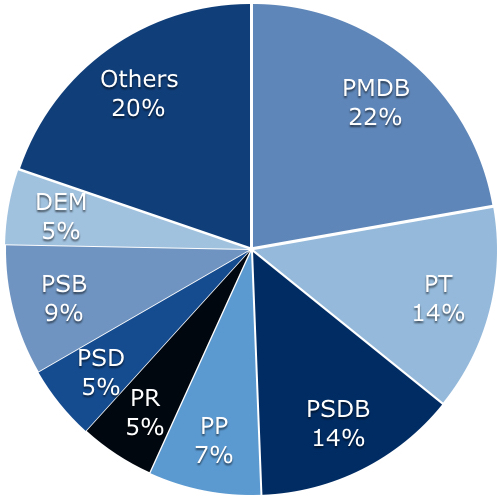In a marathon voting session, a clear majority of Senators (55-22) voted to progress with impeachment proceedings in Brazil. In a move that is widely seen as the first step towards ending the 13-year-rule held by her Leftist Workers’ Party, Dilma Rousseff has been suspended from Office for a minimum of 180 days while she stands trial. At a time of great social and political significance for the country, with an economy in recession and the 2016 Summer Olympics on the horizon, new and reformative leadership is finally within reach.
55 out of 77 Senators voted to try Rousseff on charges that she illegally manipulated fiscal accounts during her re-election campaign. Although she denies these allegations, there is no ignoring her plummeting approval ratings as the country is left disillusioned from her calamitous second term. Now stepping aside during the trial proceedings, Vice President Michel Temer will take over office. If Rousseff is ultimately ousted, an outcome that would rely on two-thirds of the Senate voting for her conviction, Temer will serve out the remainder of her term (which runs until 2018).
While analysts, politicians and the Brazilian media unanimously discredited Rousseff’s ability to restore investor confidence and unify a rebellious congress, foundations were already being laid for a post-Rousseff government. Taking the reins, Vice President Michel Temer had prepared for this new government for months by negotiating Cabinet positions with potential allies from the center-right Brazilian Democratic Movement Party. In an unspoken speech leaked to the press, Temer revealed he would dedicate his time in office to reversing Brazil’s high budget deficit and public debt through greatly needed austerity measures. He has even demonstrated a willingness to defer policy such as interest rates and the rate of return for investors in infrastructure to independent regulators and the private sector. At the same time he pledged to maintain Bolsa Familia, the cash transfer scheme many poverty-stricken Brazilians rely on.
Brazil’s Largest Political Parties in the Senate
Source: Council of the Americas (2016)
We are thrilled to see this government has acknowledged the need for wide-ranging reforms. A return to more responsible fiscal and monetary policy, facilitated by the center-right leanings of Temer’s new government, will allow Brazil to realize its enormous potential.
Brazil is already a country that has experienced incredible development throughout most of the last century. From 1930 – 1980, Japan was the only nation in the world whose gross domestic product (GDP) grew faster that Brazil’s. Since 1995, solid growth and globally renowned social programs lifted roughly 40 million people (20% of the population) out of poverty and into the middle class. 60 years ago over half of Brazilians were illiterate and malnourished. In the matter of a single lifetime, Brazil transformed itself into the world’s 8th largest economy and became one of the few countries to reduce inequality so effectively.
Imagine what can be achieved with this next generation.
